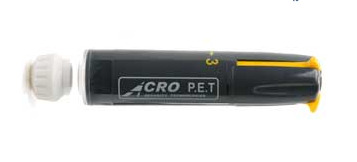A new weapon in the arsenal shared by airport security personnel and police resembles a pen but can detect bomb detonators in powder form at as little as five micrograms.

It’s a white crystalline powder with a distinctive acrid odor. TATP is a peroxide bomb detonator and an explosive of choice for airport bombers. If it had been detected at Schiphol Airport in Amsterdam, the underwear bomber en route to Detroit several months ago would have been foiled much sooner.
Would-be bombers have managed to smuggle TATP on board before. In 2001, Richard Reid of al-Qaeda targeted American Airlines Flight 63 with a TATP trigger for a bomb concealed in his shoe. But underwear and shoe bombers beware: A technology developed by Israelis and Americans is now your nightmare.
Collaboration between an American researcher and Prof. Ehud Keinan of the Technion – Israel Institute of Technology has culminated in a new way to foil terrorists carrying TATP-based explosives. Resembling a pen – although you can’t write with it – the device is a new weapon in the arsenal shared by airport security personnel, police and environmentalists. Keinan and Prof. Philip Dawson from the Scripps Research Institute, La Jolla, California, recently developed and commercialized the ACRO-P.E.T. (Peroxide Explosives Tester) – a simple and cost-effective device for detecting TATP.
Operated by touch, the sensitivity of the device is quite high, as it can identify as little as five micrograms of TATP, an amount that can’t be seen by the human eye. An operator touches the tip of the device to the surface of the suspicious material. The tip is then removed and the operator replaces it on the “pen” and presses three levers, each of which releases 300 micro liters of solution. A color change indicates the presence of TATP. If it’s there, that’s the time to make arrests.
“It’s a next generation tool,” Keinan tells ISRAEL21c, “most airports are not equipped with any devices [like this].”
Pinpointing terrorists before it’s too late
At a cost of about $25 per unit, the explosives tester is being sold through Acro Security Technologies. Founded and based in Israel, Acro Security sells the ACRO-P.E.T. and other products to pinpoint terrorists before it’s too late.
The pen-like device is a disposable item that can be used by non-experts, like US troops in the Middle East, customs police, regular police and even environmentalists.
“Sometimes we face environmental hazards that use peroxide-based chemicals,” Keinan relates. “But it’s especially useful at airports for reducing false positives any time peroxides or suspected peroxide materials are found. The main thing is the war against terror.
“Some major airlines equip every plane with these detectors. If, for example, the 25th of December Nigerian guy – if they knew using this device what material they had on board, they could have reported the material before landing. Knowing beforehand is important to know how dangerous a material is and how it should be handled, whether it’s real or fake,” Keinan explains.
Keinan hopes that the ACRO-P.E.T. device will be made available on all flights, giving airline hosts a quick and accurate way to test suspicious materials they may discover. This will help ground authorities to prepare better and respond more rapidly if a suspected terrorist manages to make his or her way on board.
Hard to detect, until now
TATP is extremely lethal and has played a role in major terrorist attacks for the past three decades, relates Keinan: “There are several reasons for the popularity of TATP among terror groups all over the world. It’s easy to prepare from inexpensive raw materials, and was difficult to detect [until now].”
Previous research on the science behind the device was reported in the journal Crystal Growth and Design. And lucky for Keinan, he retained royalty rights after the Technion showed no interest in helping him to commercialize the research.
Keinan and Dawson’s research was funded by organizations like the Binational Science Foundation (BSF), an Israel-US initiative that funds science research between the two countries to meet common goals.
“We invented the chemistry,” Keinan tells ISRAEL21c. “It’s based on enzyme catalysis, a colorimetric system sensitive to hydrogen peroxide. We developed the methodology, and hold the American patent, which is the basis of the product. It’s been commercialized for about one and a half years and it’s picking up momentum.”
Dawson’s lab has developed new protein engineering tools that enable synthetic organic chemistry to be applied directly to proteins. These tools are being used to address fundamental questions in protein folding, stability and enzymatic catalysis.
Ten years of science
Working on the science behind it for about 10 years, it took several years for the researchers to find the right investors to take their idea to the commercial phase. The Israeli contribution escorted the product through development, and through the first, second and third prototypes. The final product is now in use around the world in South Africa, Australia and China, and also in the US where the company is now focusing its marketing efforts.
Aside from his work on ACRO-P.E.T., Keinan is still working on research at the Technion and is an associate professor at Scripps. He would gladly tell ISRAEL21c about his latest project, but “it’s security-related and highly classified,” he admits.












